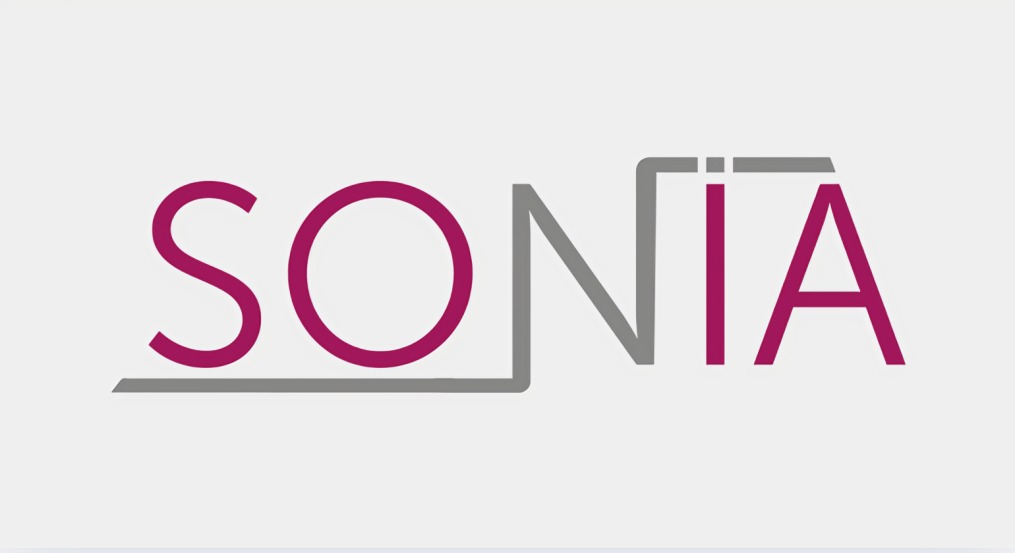Evaluating the Impact of CDK4/6 Inhibitors in First- and Second-Line Endocrine Therapy for HR+, HER2- Advanced Breast Cancer
The first results of the Dutch SONIA study were presented at the ASCO Annual Meeting on June 5th, 2023. This study explored the optimal timing for adding CDK4/6 inhibitors (abemaciclib, palbociclib, ribociclib) to endocrine therapy in patients with hormone receptor-positive advanced breast cancer. The principal investigators of the trial were Agnes Jager, Gabe Sonke, and Inge Konings.
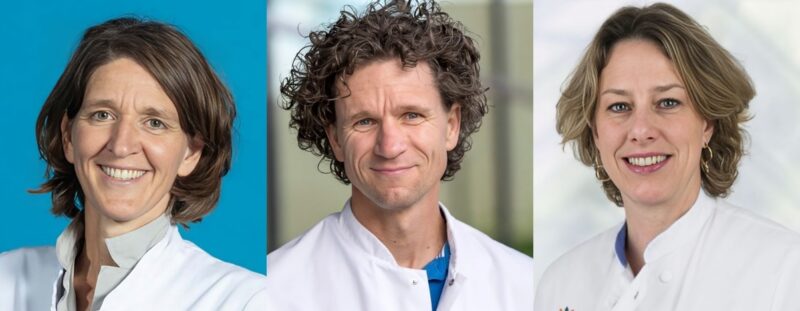
Authors: Gabe S. Sonke, Annemiek Van Ommen – Nijhof, Noor Wortelboer, Vincent van der Noort, Astrid C. P. Swinkels, Hedwig M. Blommestein, Aart Beeker, Karin Beelen, Lisanne C. Hamming, Joan B. Heijns, Aafke H. Honkoop, Paul C. De Jong, Quirine C. Van Rossum-Schornagel, Christa van Schaik-van de Mheen, Jolien Tol, Cathrien Tromp-Van Driel, Suzan Vrijaldenhoven, A. Elise Van Leeuwen-Stok, Inge Konings, and Agnes Jager
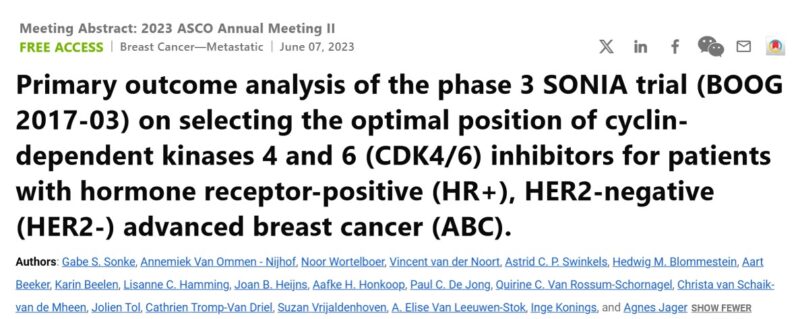
Early versus deferred use of CDK4/6 inhibitors in advanced breast cancer | Nature
Authors: Gabe S. Sonke, Annemiek van Ommen-Nijhof, Noor Wortelboer, Vincent van der Noort, Astrid C. P. Swinkels, Hedwig M. Blommestein, Cristina Guerrero Paez, Linda Mol, Aart Beeker, Karin Beelen, Lisanne C. Hamming, Joan B. Heijns, Aafke H. Honkoop, Paul C. de Jong, Quirine C. van Rossum-Schornagel, Christa van Schaik-van de Mheen, Jolien Tol, Cathrien S. Tromp-van Driel, Suzan Vrijaldenhoven, A. Elise van Leeuwen-Stok, Inge R. Konings, Agnes Jager and SONIA Study Consortium
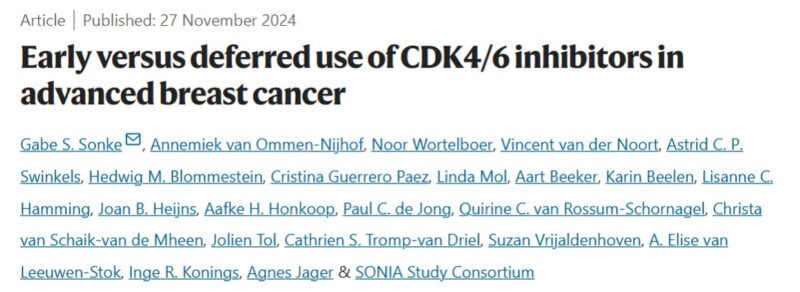
About SONIA Trial
The phase-3 SONIA trial, a nationwide, randomized, investigator-led study, is investigating the effectiveness, safety, and cost-efficiency of adding a CDK4/6 inhibitor (CDK4/6i) to either first- or second-line endocrine therapy (ET) in patients with HR+, HER2- advanced breast cancer (ABC) who have not received prior ABC treatment.
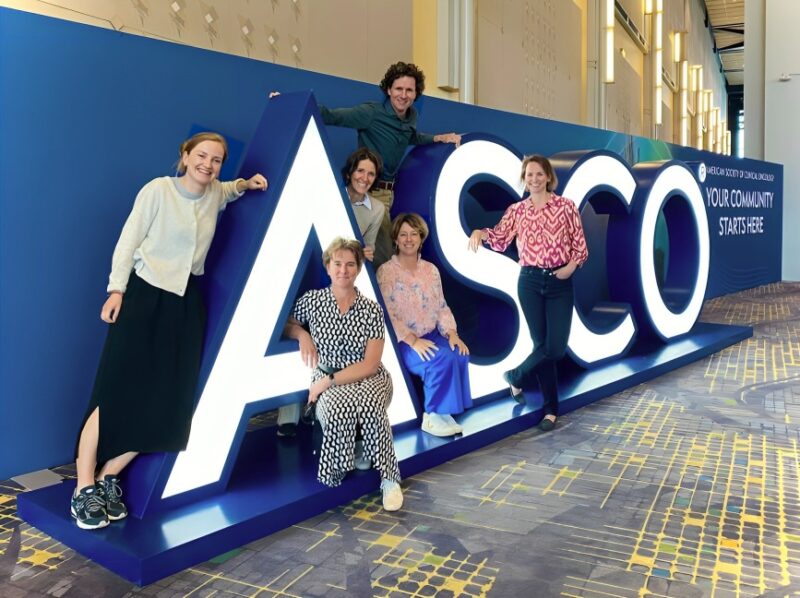 From left to right: Noor Wortelboer (study coordinator), Elise van Leeuwen-Stok (director BOOG), Agnes Jager (principal investigator), Gabe Sonke (principal investigator), Inge Konings (principal investigator) and Annemiek van Ommen-Nijhof (study coordinator)
From left to right: Noor Wortelboer (study coordinator), Elise van Leeuwen-Stok (director BOOG), Agnes Jager (principal investigator), Gabe Sonke (principal investigator), Inge Konings (principal investigator) and Annemiek van Ommen-Nijhof (study coordinator)
Adding a CDK4/6i to ET has been shown to improve progression-free survival (PFS) and overall survival (OS) in HR+, HER2- ABC, both as a first-line treatment and after previous endocrine monotherapy in the second-line. While most international guidelines recommend using CDK4/6i in the first-line setting, despite its prolonged side effects and significant increase in cost compared to the second-line, there is no head-to-head evidence proving the superiority of first-line treatment over second-line.
Methods
A total of 1,050 pre- and postmenopausal women, with measurable or evaluable HR+, HER2- advanced breast cancer (ABC) and a WHO performance status of 0-2, were enrolled in 74 Dutch hospitals. These patients had received no prior treatment for ABC and had a disease-free interval of more than 12 months after non-steroidal aromatase inhibitor (NSAI) therapy if they had received (neo)adjuvant treatment. Participants were randomly assigned in a 1:1 ratio to one of two treatment strategies:
“Very grateful to all patients who participated in the SONIA trial and proud of the study team and all participating sites. These results can help to reduce toxicities of CDK4/6 inhibitors in advanced breast cancer and reduce the treatment burden on patients and health care systems.” – said Gabe Sonke, PI of SONIA Trial
Strategy A, which involved first-line treatment with an NSAI plus a CDK4/6 inhibitor (CDK4/6i), followed by fulvestrant (F) upon disease progression, or Strategy B, which involved first-line treatment with an NSAI, followed by fulvestrant plus a CDK4/6i upon progression.
The choice of CDK4/6i (abemaciclib, palbociclib, or ribociclib) was left to the treating physician and was used as a stratification factor. The primary endpoint was progression-free survival 2 (PFS2), defined as the time from randomization to the second objective disease progression or death, as assessed by local investigators. Secondary endpoints included overall survival (OS), safety, quality of life, and cost-effectiveness.
Results
After a median follow-up of 37.3 months (with a data cut-off on December 1, 2022), the median progression-free survival (PFS2) was 31.0 months for Strategy A, compared to 26.8 months for Strategy B (hazard ratio 0.87; 95% confidence interval, 0.74 to 1.03; P=0.10). The treatment effect remained consistent across all predefined subgroups.
The safety profile was typical for endocrine therapy (ET) combined with a CDK4/6 inhibitor. The median duration of CDK4/6i treatment was 24.64 months for Strategy A and 8.08 months for Strategy B, showing a difference of 16.56 months. The total number of grade ≥3 adverse events was 2,782 for Strategy A and 1,620 for Strategy B.
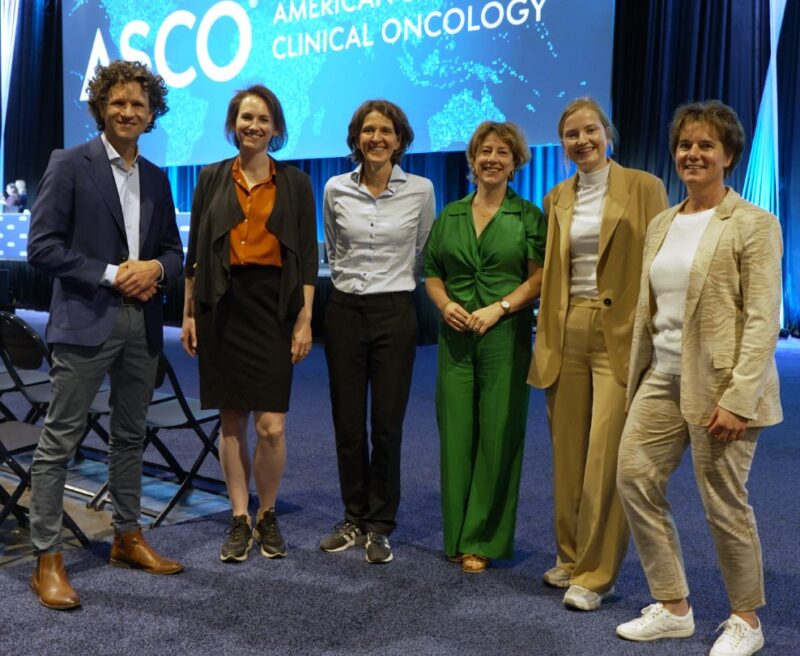
Summary
The addition of a CDK4/6 inhibitor to endocrine therapy (ET) in the first-line setting does not offer a statistically significant or clinically meaningful progression-free survival (PFS) benefit compared to its use in the second-line for women with HR+, HER2- advanced breast cancer (ABC).
First-line treatment does extend the time on CDK4/6 inhibitor therapy by 16.56 months but also increases both toxicity and costs. Therefore, second-line treatment may be the preferred option for most patients.
Discussions and posts highlighting SONIA Trial:
The Netherlands Cancer Institute:
“𝗙𝗶𝗿𝘀𝘁 𝗿𝗲𝘀𝘂𝗹𝘁𝘀 𝗼𝗳 𝘁𝗵𝗲 𝗦𝗢𝗡𝗜𝗔 𝘁𝗿𝗶𝗮𝗹 𝗮𝗿𝗲 𝗻𝗼𝘄 𝗽𝘂𝗯𝗹𝗶𝘀𝗵𝗲𝗱 𝗶𝗻 𝗡𝗮𝘁𝘂𝗿𝗲
The prestigious journal Nature published the initial results of the SONIA study today. The study showed that delaying and shortening the duration of treatment with CDK4/6 inhibitors for patients with hormone receptor-positive advanced breast cancer, leads to similar survival outcomes while reducing toxicity and achieving substantial cost savings.
This is the first time an efficiency study like this has been conducted in collaboration with Dutch health insurance providers and the Ministry of Heath, and it highlights the importance of research into the efficient use of medicines for patients, physicians, and policymakers worldwide.
Today’s publication in Nature underlines the potential of this type of self-funded efficiency research. The SONIA results reaffirm the need for robust sequencing trial data to determine the optimal use of our available therapies. But most importantly, this type of mostly post-marketing academic research can be of great benefit to patients and society, and should be conducted more frequently.
We are very proud to have conducted this study within the Dutch Breast Cancer Cancer Research Group (BOOG Study Center) and in collaboration with the Dutch Breast Cancer Society (BVN), the Netherlands Comprehensive Cancer Organisation (IKNL (Integraal Kankercentrum Nederland)) and the institute for Medical Technology Assessment (iMTA). We want to thank all the patients who have participated in the trial, as well as the study staff throughout all 74 participating hospitals.
We extend a special appreciation to the principal investigators Agnes Jager, Gabe Sonke and Inge Konings, and their PhD students Annemiek van Ommen – Nijhof and Noor Wortelboer. Last, the study team wants to thank the Netherlands Organization for Health Research (ZonMw) and Development and Dutch Health Insurers (ZN) for funding this trial.”
“The results of SONIA are out on Nature. 1L use of palbo did not improve PFS over 2L use, but led to more AEs & costs. An evolving treatment landscape challenges its interpretation— yet it shows that sequencing trials are possible. Congrats to the authors!”
“Glad to see the wonderful SONIA trial published in Nature! Great data to guide treatment decision making and healthcare spending across the world. Also great to see studies done without pharma biases.”
“Out in Nature results of SONIA trial presented at ASCO23…very important academic effort, super congrats to Gabe Sonke et al…but use of Palbociclib in most cases, superiority design and relatively short follow-up should be considered.”
“The results of the SONIA trial on the early vs deferred use of CDK4/6i in advanced breast cancer are now published in Nature.
No statistically significant benefit for the use of CDK4/6i as a first-line compared with second-line treatment.”
“First results SONIA study published!
The leading journal Nature published the first results of the SONIA study today. This study has shown that later and shorter use of CDK4/6 inhibitors in patients with metastatic breast cancer works just as well, but has fewer side effects and leads to much lower costs.
It is the first time that an efficiency study has been carried out in collaboration with the health insurer and the Ministry of Health, Welfare and Sport and it emphasizes the importance of efficiency studies into the use of drugs in cancer, among other things, for patients, practitioners, and policymakers worldwide. The publication in Nature underlines that this Dutch method is also being watched with great interest internationally and is a huge incentive to jointly do these kinds of studies much more often.
We are very proud that we have succeeded in doing this study within the Borstkanker Onderzoek Groep (BOOG) (BOOG Study Center ) network in collaboration with, among others, BVN – Borstkankervereniging Nederland – Breast Cancer Association Netherlands, IKNL (Integraal Kankercentrum Nederland) and Erasmus School of Health Policy & Management (Erasmus School of Health Policy & Management (ESHPM) ).
Thank you to all participating patients and hospitals throughout the Netherlands who contributed to this result. An enormous effort has been made by the principal investigators Agnes Jager, Gabe Sonke and Inge Konings and their PhD students Annemiek van Ommen – Nijhof and Noor Wortelboer. Also thanks to ZonMw and Zorgverzekeraars Nederland for the financial support.”
“In the context of SONIA trial getting officially published today, here is my commentary on the trial from last year’s ASCO when these data were presented.”
“SONIA trial
39.5% of CDK4/6-1L group vs. 23.1% of CDK4/6-2L group are still under their first-line treatments at data cut-off.
So, less patients in CDK4/6-1L group received additional 2L fulvestrant.
Isn’t it early to report that 1L and 2L CDK4/6 provide equal PFS2?”
“Hugely interesting paper in Nature about SONIA trial challenging frontline CDK4/6 use in breast cancer – does this have implications for practice today?”
“Nature, Published online: 27 November 2024; doi:10.1038/s41586-024-08035-2The phase 3 SONIA trial challenges the benefits of using cyclin-dependent kinase 4 and 6 inhibitors as a first-line compared with second-line treatment.”
“Primary investigator’s perspective on the design and results of the SONIA study, an academic-driven trial challenging the thesis of administering the most effective drugs upfront in oncology.
I congratulate the study team on their work.”


